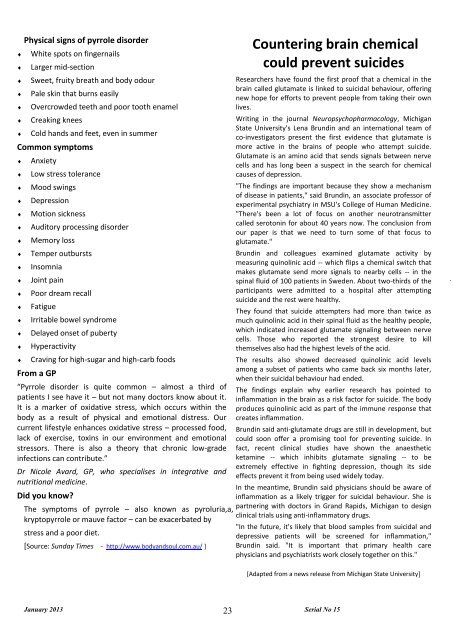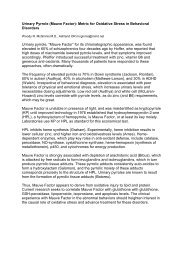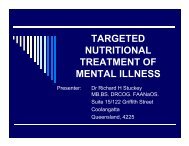Download PDF - Bio-Balance Health
Download PDF - Bio-Balance Health
Download PDF - Bio-Balance Health
- No tags were found...
You also want an ePaper? Increase the reach of your titles
YUMPU automatically turns print PDFs into web optimized ePapers that Google loves.
Physical signs of pyrrole disorderWhite spots on fingernailsLarger mid-sectionSweet, fruity breath and body odourPale skin that burns easilyOvercrowded teeth and poor tooth enamelCreaking kneesCold hands and feet, even in summerCommon symptomsAnxietyLow stress toleranceMood swingsDepressionMotion sicknessAuditory processing disorderMemory lossTemper outburstsInsomniaJoint painPoor dream recallFatigueIrritable bowel syndromeDelayed onset of pubertyHyperactivityCraving for high-sugar and high-carb foodsFrom a GP“Pyrrole disorder is quite common – almost a third ofpatients I see have it – but not many doctors know about it.It is a marker of oxidative stress, which occurs within thebody as a result of physical and emotional distress. Ourcurrent lifestyle enhances oxidative stress – processed food,lack of exercise, toxins in our environment and emotionalstressors. There is also a theory that chronic low-gradeinfections can contribute.”Dr Nicole Avard, GP, who specialises in integrative andnutritional medicine.Did you know?The symptoms of pyrrole – also known as pyroluria,a,kryptopyrrole or mauve factor – can be exacerbated bystress and a poor diet.[Source: Sunday Times - http://www.bodyandsoul.com.au/ ]Countering brain chemicalcould prevent suicidesResearchers have found the first proof that a chemical in thebrain called glutamate is linked to suicidal behaviour, offeringnew hope for efforts to prevent people from taking their ownlives.Writing in the journal Neuropsychopharmacology, MichiganState University's Lena Brundin and an international team ofco-investigators present the first evidence that glutamate ismore active in the brains of people who attempt suicide.Glutamate is an amino acid that sends signals between nervecells and has long been a suspect in the search for chemicalcauses of depression."The findings are important because they show a mechanismof disease in patients," said Brundin, an associate professor ofexperimental psychiatry in MSU's College of Human Medicine."There's been a lot of focus on another neurotransmittercalled serotonin for about 40 years now. The conclusion fromour paper is that we need to turn some of that focus toglutamate."Brundin and colleagues examined glutamate activity bymeasuring quinolinic acid -- which flips a chemical switch thatmakes glutamate send more signals to nearby cells -- in thespinal fluid of 100 patients in Sweden. About two-thirds of theparticipants were admitted to a hospital after attemptingsuicide and the rest were healthy.They found that suicide attempters had more than twice asmuch quinolinic acid in their spinal fluid as the healthy people,which indicated increased glutamate signaling between nervecells. Those who reported the strongest desire to killthemselves also had the highest levels of the acid.The results also showed decreased quinolinic acid levelsamong a subset of patients who came back six months later,when their suicidal behaviour had ended.The findings explain why earlier research has pointed toinflammation in the brain as a risk factor for suicide. The bodyproduces quinolinic acid as part of the immune response thatcreates inflammation.Brundin said anti-glutamate drugs are still in development, butcould soon offer a promising tool for preventing suicide. Infact, recent clinical studies have shown the anaestheticketamine -- which inhibits glutamate signaling -- to beextremely effective in fighting depression, though its sideeffects prevent it from being used widely today.In the meantime, Brundin said physicians should be aware ofinflammation as a likely trigger for suicidal behaviour. She ispartnering with doctors in Grand Rapids, Michigan to designclinical trials using anti-inflammatory drugs."In the future, it's likely that blood samples from suicidal anddepressive patients will be screened for inflammation,"Brundin said. "It is important that primary health carephysicians and psychiatrists work closely together on this."[Adapted from a news release from Michigan State University]January 2013 23Serial No 15













